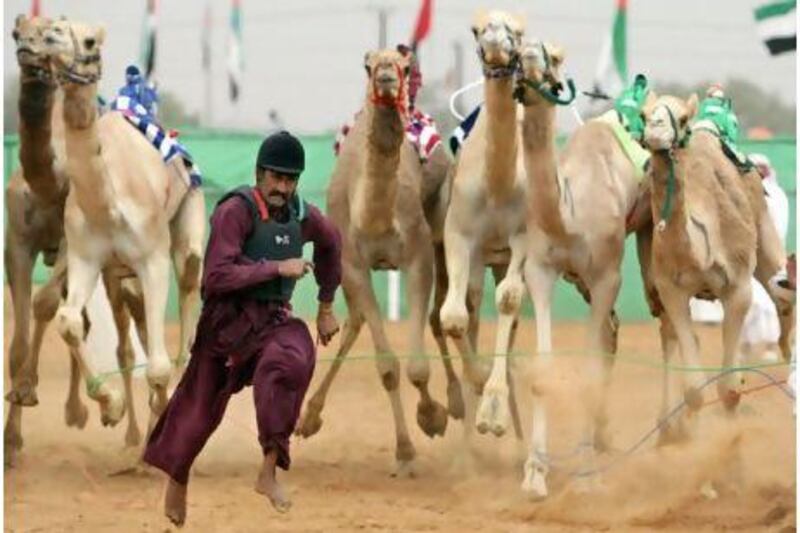RAS AL KHAIMAH // On the day of Salem Obaid's marriage, the groom raced Nabran the camel to victory.
The camel, like the women at the wedding, had its neck caked in saffron. It was 1961 and Mr Obaid took a prize of 100 rupees: 20 from each of the participants and the money he had put in himself.
The young Bedu had few riches. But he was wealthy enough, for he owned two racing camels - a prized commodity at a time when food and water were hard to come by.
"Before, my family only had the camel, not another," Mr Obaid said of the importance of the animals to the community.
Now 75, Mr Obaid can still be found at the track every day. He owns 40 racing camels that compete in corporate and sheikh-sponsored events for prizes of luxury cars and millions of dirhams. He still owns the simple prizes he won as a boy when races were a rare indulgence for special occasions and men would compete for simple treasures: a basket of dates, a cap or ghutra.
To commemorate these times, Sheikh Saud bin Saqr, the Ruler of Ras Al Khaimah, will hold races for Emiratis and their camels at the RAK Suan track on November 30 for National Day. From November 20 to November 27 men can register for three categories: 500 metres for men over the age of 45, 1.5 kilometres for men aged 30 to 45, and 3km for men aged 15 to 30. The top 10 in each category will win cash prizes, with Dh5,000 for first place.
Almost immediately after the formation of the UAE, camel racing was recognised as a shared sport that could bind identity and unite Emiratis. At the racetrack, all were equal and all shared their love for the beast. Camels took names that credited old poems or new corporations, such as Etisalat. Breeds were named after tribesmen who rose to prominence through the new national sport.
"The race, it was for everyone," Mr Obaid said. "For sheikhs, for men, for all the people. At that time it was a weak sport, there wasn't a lot of money. But from 1971, Sheikh Zayed started to make all the courses."
The 6km oval track in RAK opened in 1990 at the same time that Sheikh Zayed opened tracks in Ajman, Umm Al Qaiwain, Suweihan, Al Dhaid, Kashaba, Malaqat and Abu Samra.
Camel farms and majlises sprung up in the dunes by the track.
On the first night of Eid this year Mr Obaid joined friends from the ages of 18 to 80 at a majlis beside the track to watch a televised camel beauty pageant.
With serious money to be won, racing is more popular than ever and on any given Friday, thousands of men leave the cities for the track.
"Maybe 100 years ago we raced the camel, but before there was no money. Before it was for happiness," said Mohammed Muradad, the director of the Suan track. "The money only came after Sheikh Zayed. Now the camel is a better salary."
RAK has more than 1,000 active racing camels. Distances raced vary according to age. From ages 6 and up, the distance is 6km. A good time is 6 minutes. Sheikhs sponsor races and municipalities give additional support, like free meals to traders who live beside the racetrack during festivals. Races are divided between sheikhs and tribes, and according to pedigree. Often, sheikhs will share their winnings with all who surround the track.
Races now have purses so large that they draw competitors and traders from across the GCC. As the sport grew more competitive in the mid-1980s, trainers began to use child jockeys from South Asia, a practice that was banned in 2005. Now, remote-controlled robot jockeys are used by men who drive alongside the track and in recent years there has been a revival of Emirati jockeys.
"All men are happy for that," said Ali Al Kibali, 43, an Emirati coach who was a jockey as a teenager. "Now the remote control is very, very nice. My father put me on the camel, that is what it was 40 years ago. Before it was Emiratis only."
His son Mohammed Al Kibali, 18, hopes to compete in the upcoming races. Older men approve, saying the track will keep the young man away from shopping malls and other temptations.
"Camels are everything in my life," Mohammed said. "They are the best thing in my life. All the Bedouin boys think so."






